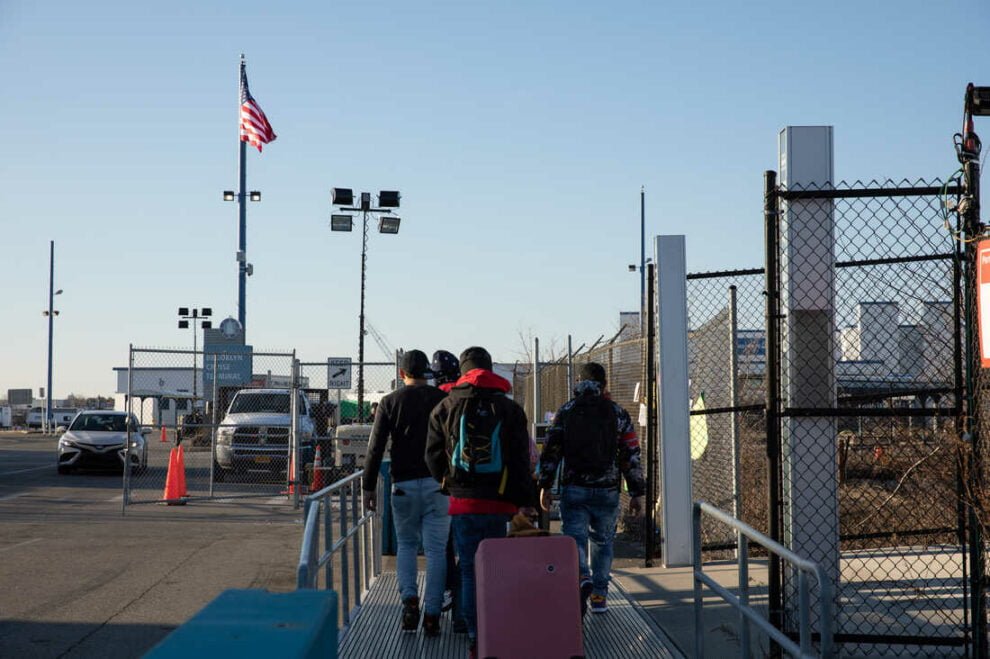The US homeland security secretary, Alejandro Mayorkas, has a message for migrants that he has been repeating loudly and frequently: “Our border is not open … don’t risk your life and your life savings” to come to the US seeking refuge without invitation.
But for millions, hunger, violence and fear ring out louder. Political dysfunction and economic calamity are pushing people from many nations in the western hemisphere in what Joe Biden has called the “largest migration in human history”, exacerbated in Latin America and beyond by the coronavirus pandemic.
People with tenacity but few means make a hopeful journey mostly across land towards the US-Mexico border. If they beat the odds to reach American soil they may find harbor – or more heartbreak.
Yesi Ortega choked up when talking to the Guardian at a shelter in El Paso, west Texas, earlier this month, as she recounted the odyssey she, her husband Raphael López and their five-year-old son, Matías, had spent six months making.
The family had reached a tipping point in their native Venezuela and followed more than 7 million other citizens who have fled the country’s economic collapse and pervasive hunger when their choice came down to food or clothing, Ortega, 24, said.
“We had no option. We needed to take the risk,” she said. Like almost a third of this exodus, they first tried nextdoor Colombia, itself unstable and contributing amid the post-pandemic hardship to the latest rise in migration towards the US.
Ortega found work in a restaurant kitchen and López labored in a plastics factory in Medellín. But they were paid less, as migrants, the equivalent of $35 a week between them, when a staple such as milk was $3 a liter and the rent was crippling, she said.
When they failed to get legal status and couldn’t access the healthcare system or school for Matías, like many others they left Colombia for the US.
They survived the slog and danger of walking through the hellish Darién Gap jungle into Panama and trudged through Central America and Mexico, fraught with risk, especially for foreigners migrating on a shoestring.
The family didn’t use human smugglers, Ortega said. She recounted how, along the way, they were mugged twice at gunpoint, slept under torrential rains and endured cold nights, leapt on to freight trains when they could, worked temporary jobs and begged for money to buy food, water and bus tickets to relieve the trek whenever possible.
Eventually, they reached Ciudad Juárez, across the Mexican border from El Paso. After all that, Matías then broke his right arm while playing. But the family pressed on and went to Door 40 in the towering border barrier to turn themselves in to federal border patrol agents.
At first they were separated. Ortega and Matías were taken and held in New Mexico while López, 27, was sent to a detention center 85 miles away in Tornillo, which became known in the Trump administration for holding unaccompanied migrant children in detention camps.
They were released after about a week of what they described as cold, uncomfortable conditions and managed to reunite and find a shelter in El Paso. Last week the three traveled to Chicago, where they had a contact address, to await their interview with the immigration authorities in June to find out if they will be allowed to go through the full asylum system in the US – or be deported.
The family entered the US before the Title 42 pandemic-related rule was lifted on 11 May, which had blocked many from requesting asylum while allowing some families with young children to do so. After that block ended, the Biden administration nevertheless brought in a “presumption of ineligibility” for asylum for people who simply turn themselves in at the border. This has enraged immigration advocates, who call the new restriction an asylum ban. No matter what, the dice are loaded against Ortega and her family if the authorities conclude they are economic migrants.
Around the corner from the shelter, fellow Venezuelan José Ocando, 28, was sleeping on the ground in an alley on a thin mat with some blankets.
He had also been living in Colombia, with his wife, but was tracked down by members of a gang who told him his impoverished mother back in Venezuela had a debt outstanding and said they would kill them both if they didn’t pay up.
“We left everything from one day to another. There was no time to figure out why these people wanted me to pay a debt I didn’t even know about,” he told the Guardian.
They fled and took buses to Monterrey in northern Mexico. There they were within geofencing range to access the US government’s app, CBP One on a smartphone, to request a US asylum appointment.
They tried every day for a month but couldn’t get an appointment, Ocando said. So they went to Matamoros, where the Rio Grande infamously claims lives and on 11 May produced scenes of frightened young children, some roped together and with little inflatable rings to stop them from drowning, clinging to their parents on the muddy riverbank as others waited up to their necks in the river, all on the wrong side of razor wire with gun-toting US troops beyond.
Ocando and his wife made it across safely, although he was detained and expelled back to Mexico, while his wife was allowed in. She traveled to Utah to join an uncle – as those claiming asylum must give an address to the authorities – and after Ocando traveled the length of the Texas-Mexico border, he was allowed into El Paso.
Now he’s found a part-time job carrying blocks on a construction site and is saving for a bus ticket to join his wife as they also await an asylum interview.
“It’s been difficult, but I feel safe here,” he told the Guardian.
Meanwhile, Fabiola Cometán, 45, also felt protected on US soil after decades of physical abuse by her two former partners, she said.
The last straw was receiving a death threat from one of her sisters in their native Peru recently over a debt, going to police and being ignored and then threatened by three men who came to her door demanding the money be paid, she said.
Before leaving Lima to join a small group of mostly Venezuelan migrants traveling together for safety overland to the US, she had to decide which of her children to take with her.
She thought of the hazards of the Darién and the danger of extortion and sexual assault in Mexico, she said.
She sobbed as she said she took her six-year-old son and left her nine-year-old daughter behind with another sister, to protect her from the greater risk of being raped or kidnapped.
“My heart broke into pieces, but I had to leave her to come here and find a better opportunity for all of us,” she said.
She plans to make her way to New York and go through the asylum process there. Her son, Luis, talked excitedly of going to school and one day seeing snow.
Source: The Guardian
















